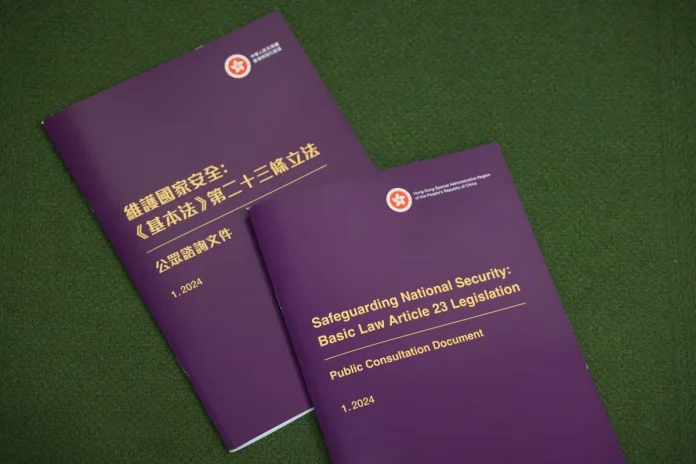A public consultation on Hong Kong’s new national security law concludes on 28 February amid fears that the law will further undermine freedoms in the financial hub.
The law, known as Article 23, aims to address what officials call loopholes in the national security regime, bolstered in 2020 by another national security law introduced directly by China.
It would prosecute offences such as treason, theft of state secrets, espionage, sabotage, sedition and “external interference,” including by foreign governments.
Hong Kong’s legislature is expected to approve it. The law comes amid attempts by the city to improve its image and economy in the wake of international criticism of the Chinese-led crackdown on freedoms and dissent. A group of 80 civil society groups, including British-based Hong Kong Watch, wrote in a joint statement:
Many of these proposed provisions are vague and criminalise people’s peaceful exercises of human rights, including the rights to freedom of association, assembly, expression and the press.
However, Hong Kong authorities argue that the new law is necessary as “threats posed by external forces and local terrorism remain,” emphasising that national security is a “fundamental pre-requisite for the survival and development of a state.”
A previous attempt to pass Article 23 in 2003 was shelved after some 500,000 people protested against it. This time there have been no large-scale protests, with most of the public supporting the legislation so far. Mark Daley, a Hong Kong-based human rights lawyer, stated:
“The United Nations Committee of human rights experts already concluded in 2022 that the sedition provisions should be repealed and Hong Kong should refrain from using them to suppress the expression of critical and dissenting opinions.”
The Law Society of Hong Kong also suggested that the government consider adding a “public interest” defence to the offence relating to the disclosure of state secrets, as well as clarifying what can be considered a state secret, including trade ones.
Commercial sector requires certainty in the business environment it is operating in.
The Hong Kong Journalists Association (HKJA) stated that the scope and definition of what constitutes “state secrets,” was very broad and vague, especially in relation to the recently added categories, which included economic and social development.
